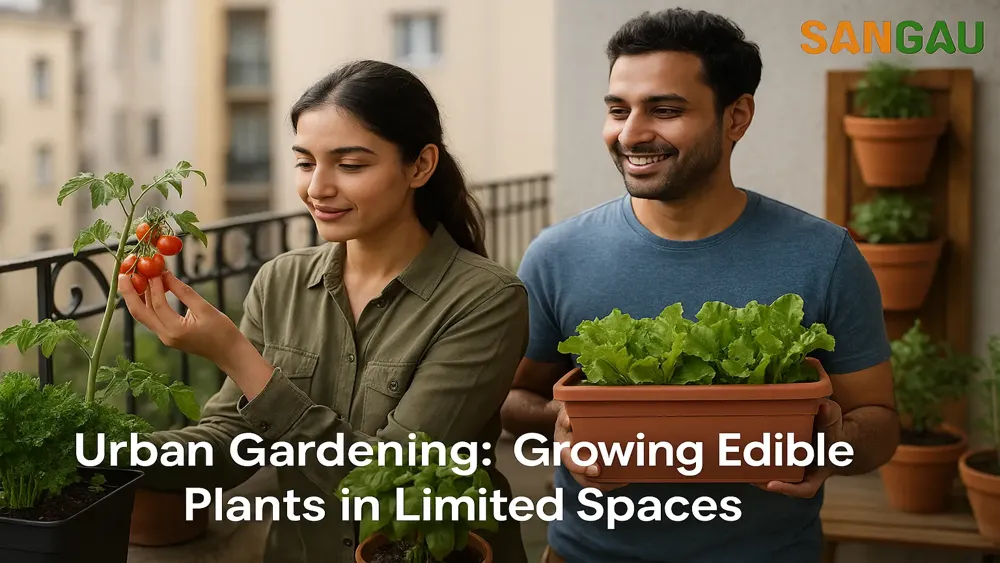Urban Gardening - Growing Edible Plants in Limited Spaces
Published : 24 Jun 2025

Urban Gardening: Growing Edible Plants in Limited Spaces
Urban gardening has seen a massive surge in popularity, as city dwellers seek the chance to grow their own fresh produce, even in the confines of compact flats or small outdoor areas. Growing your own edible plants in these small spaces doesn't just boost the flavour of your meals; it's also a step towards sustainability, reducing our reliance on shop-bought items with all that excess packaging. The good news is, turning limited spaces into productive gardens is easier than you might think, whether it's a tiny kitchen counter or a cosy balcony.
1. Selecting the Best Edible Plants for Compact Gardens
Choosing the right plants is vital when you're gardening in small spaces. Some edible plants are perfectly suited to container gardening, making them ideal for those limited areas. Take cherry tomatoes, for example. They thrive in pots and can be trained to climb with trellises, which is a brilliant way to maximise vertical space. For quicker results and efficient use of space, consider lettuce and radishes. And let's not forget herbs like basil, parsley, and thyme – they flourish in small containers, giving you fresh seasoning at your fingertips and really enhancing your cooking.
2. Mastering Container Gardening Essentials
Container gardening is a very effective method for growing edible plants where space is at a premium. The secret to success is choosing the right containers with drainage holes to stop the soil from getting waterlogged and causing root rot. You can use traditional pots, hanging baskets, or even repurposed items like buckets and crates. Just make sure each container is deep enough to support the plant's root system, which will encourage healthy growth and plenty of produce.
3. Optimising Soil for Thriving Edible Plants
The right soil is fundamental to successful container gardening. Unlike dense garden soil, a high-quality potting mix designed for containers provides the drainage and aeration that healthy roots need. Boosting your soil with compost or organic matter will enrich its nutrient content, promoting vigorous plant growth. It's also a good idea to tailor your potting mix to suit the specific needs of whatever you're growing, ensuring each plant has the best possible conditions.
4. Leveraging Vertical Gardening to Maximise Space
Vertical gardening is an excellent solution when horizontal space is limited; it allows you to grow plants upwards. Climbing plants like peas, cucumbers, and beans thrive when they're supported by trellises or other vertical structures. Hanging baskets and wall-mounted planters are also great for making the most of vertical space. What's more, using shelves or racks means you can grow herbs and small vegetables in layers, optimising every bit of space you have.
5. Ensuring Adequate Light for Robust Plant Growth
Light is crucial for urban gardening success. Most edible plants need at least six hours of direct sunlight a day to grow healthily and produce a good yield. If you don't have enough natural light, especially indoors, you can use artificial grow lights to supplement the sunlight. LED grow lights provide the full spectrum of light that's necessary for photosynthesis, encouraging strong growth and vibrant produce.
6. Crafting a Convenient Kitchen Garden
Creating a small kitchen garden is a really convenient way to grow herbs, leafy greens, and compact vegetables right where you cook. Make use of windowsills, countertops, or hanging baskets above the sink so you can easily access fresh ingredients. Herbs like basil, coriander, mint, and chives thrive in small pots, while quick-harvest crops like spinach, lettuce, and radishes can be ready to eat in just a few weeks. A kitchen garden not only adds fresh flavours to your cooking but also reduces food waste by allowing you to harvest only what you need.
7. Transforming Balconies into Productive Gardens
A balcony garden can accommodate a wide variety of edible plants, from herbs and vegetables to dwarf fruit trees. Use railing planters, hanging pots, or vertical shelves to maximise the space. Sun-loving vegetables like tomatoes, peppers, and beans flourish on sunny balconies, while herbs and leafy greens are happy in shadier spots. Balconies are ideal for plants that need plenty of sunlight, really enhancing your urban gardening experience.
8. Planning Seasonal Planting for Continuous Harvests
Strategic seasonal planting ensures you have a steady supply of fresh produce all year round. Cool-weather crops like lettuce, spinach, and radishes do well in spring and autumn, while summer favourites like tomatoes, peppers, and beans thrive in the warmer months. Crop rotation helps to maintain soil fertility and keep pests at bay. Once you've harvested one crop, replant with something else to maximise your garden's productivity in that small space.
9. Enjoying the Rewards of Homegrown Produce
There's nothing quite like the joy of harvesting and cooking with your own produce. Picking ripe tomatoes, snipping fresh herbs, or pulling radishes from your garden gives you a real sense of achievement and satisfaction. Homegrown produce not only tastes better but also supports a more sustainable and self-sufficient lifestyle. Use your fresh ingredients in salads, soups, sauces, and smoothies, and transform your meals into truly delightful culinary experiences.
Bonus Insight: If you're just starting out with urban gardening, begin with a few easy-to-grow plants, such as herbs or leafy greens. You can always expand your garden as you become more confident and experienced. Container gardening is very flexible, allowing you to experiment and make changes based on your space and what you prefer.
Ready to get your hands dirty?
Embark on your urban gardening adventure today and transform even the smallest space into a green haven. Whether it's a windowsill, balcony, or kitchen counter, the journey to fresh, homegrown food is incredibly rewarding.
Check out our website at [Your Website Address] for more tips, tricks, and inspiration to help you cultivate your urban garden.
Happy gardening!
Hashtags:
#UrbanGardening#ContainerGardening#GrowYourOwnFood#SmallSpaceGardening#SANGAU


